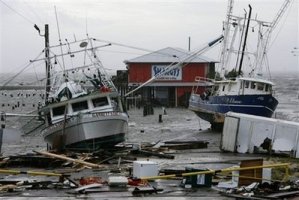It is for certain that most people do not have to be informed of the importance of getting ready for a hurricane. However, when you are a boat owner, you have a few more things to be aware of since you will be responsible for securing not only your home, but your boat as well. Getting a hurricane plan in place early is essential in allowing you to prepare your boat as efficiently and quickly as possible.
Here is an overview of what you will need to attend to in order to be better prepared in case of a hurricane watch, what to do just before the hurricane, and what to do after the storm. By the way, it is better for you to take action when the watch is issued and not wait for the actual warning.
For full, downloadable PDF checklists, go to the bottom of the article and click on the links provided.
Before Hurricane Strikes
- Purchase items needed for a hurricane preparation kit.
- Check your cleats for adequate strength – replace weak back plates and bolts with aluminum back plates and stainless steel bolts.
- Make a checklist and keep it handy (see the Additional Documents at the bottom of this article for a ready-made list). If the time comes to implement your plan, you will be less likely to forget something important.
- Take an inventory, preferably by video, of the interior, exterior, and the items in your boat. Keep it in a safe place in case you need to file an insurance claim.
- Find a sheltered “hurricane hole” if you plan to anchor your boat out, and make a plan to get there quickly and safely. See the following article for important anchoring/storage information: Hurricane Preparedness for Boat Owners
- Have someone on standby to carry out your personal hurricane plan should you be out of town when the hurricane watch is issued.
As mentioned before, it is best to take action during a hurricane watch, which is issued 36 hours in advance of a hurricane making landfall. Don’t wait until a warning is issued; it may be too late to move your boat, and preparation will become difficult because of congestion due to evacuation notices.
Additional resources:
Hurricane Preparation – Trailerable Boats
Hurricane Preparation – Moored Boats
Hurricane Preparation – Boats Anchored Out
Just prior to the Hurricane
If your plan calls for moving your vessel, move it at least 48 to 72 hours before the hurricane is estimated to strike the area (again reiterating the importance of beginning preparations early).
Check that the following items are handled:
- Fuel tanks are full.
- Fuel filters are clean.
- Batteries are charged.
- Bilges are clean.
- Cockpit drains are free and clear.
- Fire fighting equipment is in good order.
- Lifesaving equipment is in good condition, in place and readily accessible
Other things for your To-Do list:
- Remove and/or secure all deck gear, portable gear, radio antennas, outriggers, fighting chairs, deck boxes, bimini tops and side canvas/curtains, sails, booms, dorades, extra halyards, canister rafts, and dinghies.
- Secure all hatches, ports, doors, lazarettes and sailboat rudders.
- Enhance the watertight integrity of your boat, both above and below the water line. Seal windows, doors and hatches, if necessary, with duct tape. Shut sea cocks and cap off or plug unvalved through-hull fittings, such as sink drains.
After the Hurricane
- Before moving anything, photograph or video all damage to the boat thoroughly.
- Contact your insurance company to file a claim.
- If your boat is sunk, do not sign any salvage agreements without prior approval, and get your engines “pickled” right away by a marine mechanic.
- Take steps to reduce further water damage or weathering by securing openings that may have leaked.
- Clean your boat as quickly as possible to reduce mildew and rotting.
- With your insurance company’s approval, get an estimate to repair the damages from a reputable facility.
It is recommended that you read as much as you can to prepare yourself. The information in this article was collected from the following sources:
BOATSAFE.com
U.S. Coast Guard
University of Florida
Extra goodie: The Florida Division of Emergency Management has an online tool to help you organize your family’s disaster plan. Do it today… before a disaster happens!
Download this handy PDF Checklist to help you stay organized.
